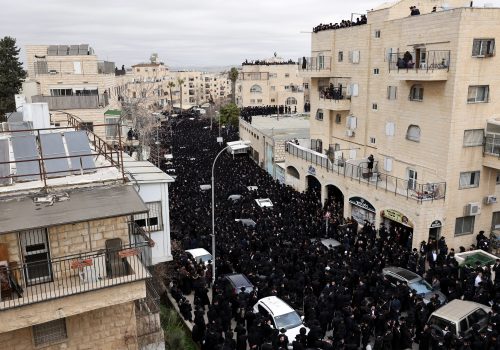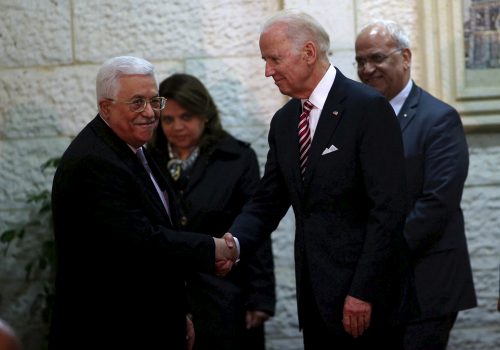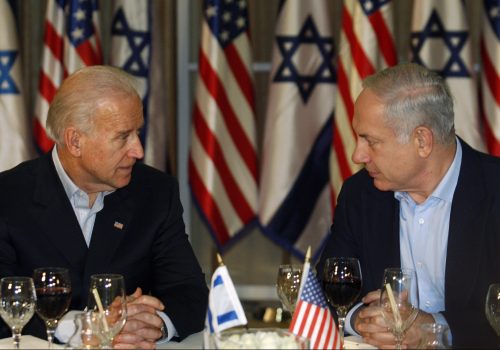FAST THINKING: How bad will Israeli-Palestinian violence get?
GET UP TO SPEED
A new conflict has erupted on an old battleground. Israeli bombings of the Gaza Strip intensified today, following Hamas rocket attacks on Israel. It’s the worst outbreak of violence there in at least seven years and has left dozens dead, mostly in Gaza. The attacks follow weeks of tensions at the al-Aqsa mosque, Islam’s third-holiest site, and efforts by Israel to remove longtime Palestinian residents from the East Jerusalem neighborhood of Sheikh Jarrah. Protests in that neighborhood have now evolved into solidarity protests and rioting in cities and towns across Israel. Is an all-out war brewing? What does this mean for Prime Minister Benjamin Netanyahu’s future? What role will regional and global powers now play in the confrontation? From Washington to Jerusalem, our experts are here to weigh in.
TODAY’S EXPERT REACTION COURTESY OF
- Tuqa Nusairat (@TuqaNusairat): Deputy director of the Rafik Hariri Center & Middle East Programs
- Jonathan Ferziger (@jhferziger): Jerusalem-based nonresident senior fellow in the Middle East programs and veteran foreign correspondent
- Shalom Lipner (@shalomlipner): Jerusalem-based nonresident senior fellow in the Middle East programs and former advisor to seven Israeli prime ministers
What’s different this time
- “What distinguishes this latest round of hostilities are the quantity, quality, and possibly duration of its component strikes,” Shalom notes. “Netanyahu’s pronouncement on May 11 that the bloodshed ‘will be on the ‘heads’ of Hamas and [militant group] Islamic Jihad—and his pledge that ‘this campaign will take time’—offer evidence that Israel has no immediate plans of drawing down its forces.”
- Given the barrage of Hamas rocket attacks on Tel Aviv, “Israelis haven’t felt this vulnerable to violence in recent memory,” Shalom says.
- There is ample blame to go around, as Jonathan sees it, given how tensions have been rising for years. “This is a proto-war stemming from neglect across the board—from Israel, the Palestinian Authority, the US, Egypt, Jordan, the UAE, Qatar, and other stakeholders,” he says. US President Joe Biden spoke to Netanyahu today and dispatched an envoy to the region, but he was “caught sleeping,” Jonathan says.
- As for how the latest events differ on the Palestinian side, Tuqa points to “an organized grassroots effort by Palestinians to resist the right-wing settlers’ attempt to change the demographics of East Jerusalem.” That included a social-media campaign that gained international notice and was bolstered “by a landmark Human Rights Watch report that detailed the Israeli government’s discriminatory policies and labeled them ‘crimes against humanity of apartheid and persecution,’” Tuqa notes, matching Palestinians’ longstanding claims.
Mind the political fallout
- Netanyahu could be ousted from his post after a dozen years in power if his rivals form a coalition in the coming weeks, following a fourth inconclusive election in two years. Shalom notes that Netanyahu “could, ironically, reap political benefit from the deterioration” of relations with the Palestinians. The prime minister’s rivals Yair Lapid and Naftali Bennett have expressed support for the Gaza strikes, which will make crucial Arab political parties in Israel less likely to join with them to form a new government, Shalom points out. “Generally, Israelis have less of an appetite now for politics and will be less inclined also to oust Netanyahu and transfer the reins to a less experienced crew,” he says.
- Among Palestinians, Tuqa points to widespread dissatisfaction with Palestinian Authority leader Mahmoud Abbas, given the Authority’s “lack of any actual authority over their lives, and its latest attempt to subvert any semblance of a democratic process by canceling recent elections.”
- The bottom line? “The escalation in violence and the excessive use of force by Israeli security forces will put both Israelis and Palestinians back on the defensive and push them further to their respective extremes,” Tuqa says.
Where do we go from here?
- Jonathan predicts “this latest explosion of violence will get uglier before the bloodied sides decide on the next inconclusive ceasefire.”
- Shalom agrees, noting that Israel, Hamas, and Islamic Jihad “are entrenched now in a retaliatory cycle which none of them will be eager to break.”
- What about the Abraham Accords? Israel’s normalization agreements last year with Arab countries from the Gulf to Sudan mean international pressure on Israel might now be more “muted” than it has been in the past, Shalom says. Tuqa notes that Israel’s new diplomatic partners “have been irrelevant to the situation as Jordan and Egypt reclaim their status as key negotiators in what we can hope will be a new ceasefire agreement.”
- But a durable peace between the Mediterranean Sea and the Jordan River seems more remote than ever. Shalom says Israel and Hamas will eventually enter into a mediation process, perhaps involving Egypt or Qatar. “Each side will then claim a victory of sorts and resolve to improve its position in advance of future bouts which, in the absence of genuine reconciliation, are almost certain to follow.”
Further reading
Thu, Mar 18, 2021
The real threat to modern Israel
MENASource By
The March 23 election could emerge as an inflection point because Haredi behavior during the coronavirus pandemic has underscored divisions, deepened mutual disdain, and convinced many Israelis things cannot continue as they are.
Mon, Feb 22, 2021
America steps back into the ring with the Palestinians
MENASource By Jonathan H. Ferziger, Shalom Lipner
The renewed US effort to engage with the Palestinian leadership comes against the backdrop of the past four years, during which the Mahmoud Abbas government found itself consistently on the defensive.
Tue, May 26, 2020
A Biden presidency is bad news for Netanyahu, but not necessarily for Israel’s national security
IranSource By
The possibility of a Biden presidency might have a significant impact on Israel.
Image: A Palestinian walks past a building destroyed by Israel airstrikes in Gaza on May 12, 2021. Photo via REUTERS/Suhaib Salem.


